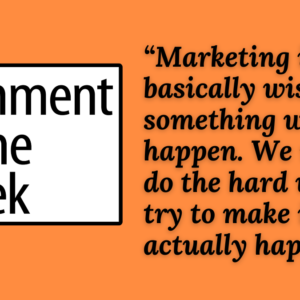(Note: The title of this post was originally, “Benefits fraud may stymie progress on Bike Commuter Act.” I changed it to better reflect the situation.).
I just got an email from Congressman Earl Blumenauer’s legislative assistant Katie Drennan. She said that although there is considerable momentum for the Bike Commuter Act (42 co-sponsors so far), there’s a situation brewing on the Hill that might cause a bump in the road.
Drennan pointed to an article in the Washington Post yesterday that details widespread fraud in the current transit benefits system. Here’s an excerpt:
“The program, which covers 300,000 federal employees nationwide, has been abused by workers across a variety of agencies… Workers in the Washington region alone have defrauded the government of at least $17 million a year, with the actual figure probably several million dollars higher, according to the GAO.”
According to the article, the most widespread problems were people selling their MetroChecks on eBay or craigslist for cash payments.
Drennan says her office is concerned about how this recent publicity might impact the Bike Commuter Act,
“…with news of the fraud coupled with the opaque nature of how bike benefits could be administered, we are worried that the bill will be the focus of increased scrutiny and ultimately members will be dissuaded from supporting it.“
According to Drennan, questions have already arisen from staffers on the Hill about how exactly the bike commuter benefits would be administered. Up to this point, she says they’ve preferred to leave the specific rules up to the employer (much like transit benefits).
So what does all this mean? This bill needs our help.
Drennan needs suggestions of ways these benefits could be applied, as well as stories from folks who have employers who actually administer bike commuter benefits currently.
Here’s how you can help:
- Please let us know what form your benefit comes in, how you use it, and the oversight mechanism is used to prevent abuse of the system.
- If you do not currently receive this, can you imagine an ideal system?
- We are looking for all ideas to start this conversation.
Please consider sharing your input in the comments below and forward this post to anyone you think could lend helpful insight.
Learn more about the Bike Commuter Act:
- Exclusive audio from Bike Commuter Act press conference in Washington D.C.
- A full report from the press conference
More info on bike commuter benefits:
- This topic recently came up on the Shift Email List.






Thanks for reading.
BikePortland has served this community with independent community journalism since 2005. We rely on subscriptions from readers like you to survive. Your financial support is vital in keeping this valuable resource alive and well.
Please subscribe today to strengthen and expand our work.
I receive a bus pass every month and I totally sell it because I ride my bike everywhere. Oops, I’m part of the problem.
my employer gave out a free Tri-Met pass to any employee who wanted one one year. But it was a sticker attached to our company ID badges. Hard to re-sell that way 🙂
My employer provides an annual Tri-Met pass (sticker on employee badge) to all employess and I also receive a 22.00 coupon to use at participating stores each month I ride (or walk) 80% of my trips to work. ie 4 of my 5 day work week. I fill out a benefits form each month stating that I will meet the program’s requirement but there is little other oversight. The coupons are in my name so I suppose the stores could ask to verify my ID but they haven’t yet.
I also only have an available parking space at my employer 4 of 5 days.
My employer lets me use my office as a locker room . . .
Not sure if it’s part of the same system, but PSU allows students to buy heavily discounted passes, but they’re part of our ID card, and you can only get one per term.
My previous employer gave gift certificates to REI or Bike Gallery. I suppose you could sell them on ebay, but Why? I would rather buy gear.
My wife’s company has you record your physical activity on a website (anything counts, not just commuting on foot/bike). You get points that are used to purchase items from a company run website. She just used her points to get a heart rate monitor.
Every government program has fraud associated. We don’t stop having medicaid because there is fraud, we try to reduce the level of fraud. Not passing this bill because some people might game the system is a cop out in my opinion.
Bjorn
At my workplace, a utility room was slightly modified and devoted to secure bike parking. We’re pretty small, with about 15 employees. I used to be the only bike commuter, but a couple of other folks now ride occasionally.
For transit passes each employer should be required to place the name of the employee and company name on a pass.(I get a monthly transit pass myself.)
They should take a holistic look at the situation and run a sample survey of all mobility benefits – double check car parking passes, car mileage reimbursements, etc. To keep this in perspective…if one were to do a search in the DC papers I believe there has been similar scams in the past by Federal employees regarding their parking passes in past years…this is not new out there in DC. (And the federal government also waives its responsibility for commute trip reduction at its own sites – the last time I looked into it – years ago.)
And then there is all that free/ under priced parking too out in office campus land.
I am self-employed, which means that I don’t have the luxury of an employer-provided benefit. And yet, I conduct much of my business by bike. My proposal is that legislation be passed for any person who purchases a bike that will be used primarily for occupational commuting purposes (either to a place of employment or for the business purposes of a self-employed person) to recieve a tax credit equal to half of the cost of the bike. So, if I purchase a $1000 bike for use in my business, then I can take $500 off of my state income taxes. Accountability may be provided by requiring employees to recieve written confirmation from employers on a quarterly or monthly basis that they are in fact bike commuting. Self-employed individuals could be required to furnish the same kind of written proof from business associates or clients or bank personnel, or whoever to verify that they conducting business by bike. Either way, the tax break comes to the individual as an incentive to start and continue bike commuting.
I work in a bike shop, and at least for us, i think it would be possible to ‘flag’ items in our database as OK for the commuter subsidy. We could then block people from charging anything other than flagged items to a voucher or account, and limit them to pre-authorized levels.
Determining what’s acceptable and what isn’t would be tough (and perhaps subjective), the extra admin work would stink, and not every shop has the resources to do this. But if the Fed can make it easy for us to bill and collect from them, it would be worth it to get more folks on bikes and in our doors.
My employer provides me with:
1. A secure indoor space to park my bike
2. A locker for my clothes
3. A shower
I think a good way to avoid fraud is to have particpants register their bike (possibly a sticker attached to bike??) with the employer and then the employer can randomly check that their bike is at work. Might not work so well for folks who don’t park in close proximity to employer.
The bike commute plan could be run the same way health care reimbursement accounts (HCRA) are run now. Receipts for qualified expenses are submitted and if they are approved a reimbursement check is issued. Fraud for health care reimbursement accounts is enough of a problem that even if I use my HCRA debit card at a pharmacy an hour after I used it at my doctor’s office I still need to follow up with a FAX showing my purchase was prescriptions and not shampoo and beer.
Another option would be to determine a benefit level based on commute miles. Employees would be reimbursed for the presumed cost of riding based on the length of their commute and a documented number of days ridden. For example, if a cost of ten cents a mile to bike commute was deemed the reimbursement level and an employee had a six mile commute, they would be reimbursed $1.20 for each day they rode.
I’d prefer the second plan due to the lower overhead cost involved.
As to current benefits, my employer today has secure (locker) parking and showers available. This is not the case at all company locations.
My work gives a discount on a yearly Tri-Met pass (Sticker on badge) and if I commute by car pool, walk, max/bus, or bike more than 50% of my work days then I get a monthly $10.00 award. Save it up for $50 or $100 and I can then cash out for a gift certificate thru giftcertificate.com (usually REI). As I work for an airline we already have locker rooms and showers for our mechanics. Located on the south side of the airport we are in a Tri-Met hole as the nearest bus stop is over a mile away with no sidewalks and heavy truck traffic. To use Airport MAX people have to go thru security (major pain) catch a shuttle van over to our hangar and for the way back catch the shuttle van, and hope they make the MAX otherwise stand around for the next train. So many people don’t use it due to the hassle. Same goes for riding a bicycle to work as the roads on the south side of the airport are narrow with no bike lanes (Cornfoot rd.) and heavy semi truck traffic. Newer riders don’t feel very comfortable with large trucks coming with in inches of them.
Fraud on commuter check type programs is trivially easy. I’m excited about the prospect of tax benefits for bike commuting, but I’ve wondered also about how this kind of program would be administered.
My employer (City of Portland) provides me a $30 monthly pre-tax benefit that’s added to my paycheck each quarter. It’s taxed because there is no provision for post-tax commuter benefit…that, of course, is the reason for Earl’s bill.
I use the money for various things over the course of the year. Last year I bought some nice bike booties. I get my bike overhauled. I buy new tubes and bike tools. Soon I’ll have to buy some new raingear. Last year I bought a new drivetrain. Generally, I’d guess most of it gets spent on bike-related repairs.
I know of someone else who is saving the money they get for biking to work on their current clunker and when they have enough money in the bank will buy a nice new commuter.
The suggestions above are well-intentioned, but the problem is that it would be a burden to require employers to closely audit benefits, which would in turn mean reduced (employer) participation, which would defeat the purpose of having such a benefit in the first place.
I suspect that the solution lies elsewhere: improved bike lanes, congestion pricing, carbon taxes, etc.
Like Roger Geller, my employer – Metro- provides a ‘pre-tax’ benefit of $22 per month for those employees who bike to work regularly – 80% of the calendar month. The difference here is that it is in the form of a Gift Certificate redeemable for $22 worth of merchandise from participating area bike and sporting goods shops. (Bike Gallery, Bicycle Repair Collective, City Bikes and REI). This sure cuts down on the fraud factor. The certificates have your name on them, and you – supposedly – are required to show your employer ID at the store.
This is an example of a Travel Demand Management (TDM) program under Oregon’s Department of Environmental Quality (DEQ) Employee Commute Options program (ECO).
Wow! That’s a lot of Three Letter Acronyms (TLAs) for one paragraph!
What about providing disincentives to drive. Employers should charge for parking.
most of the west is a big free parking lot.
The thing is that once you get it sorted out, biking to work isn’t a hardship that you need compensation for. A shower maybe, and allowances for being ten minutes late for fixing a flat, or having less than perfect hair/makup. But we need to get over most of that anyway.
Changing the macho vehicle from a 4×4 or hot rod on TV and film to a fixie wouldn’t hurt either. If anyone offers me a major movie deal that’ll be a stipulation in my contract.
-M
I think the most important issue here is to educate legislators re: the clear distinction between the discounted mass transit ticket programs, which are defrauded via people selling their discounted tickets to someone else and therefore are not being used by the individual (because they are offered more than they need, or don’t actually use mass transit) versus someone who is being a reward of any kind for biking or walking. In the latter case, the “test” is confirming the individual is actually walking or biking, whereas in the former it is whether the individual is re-selling a voucher. Apples and oranges, really.
I think the most important issue here is to educate legislators re: the clear distinction between the discounted mass transit ticket programs, which are defrauded via people selling their discounted tickets to someone else and therefore are not being used by the individual (because they are offered more than they need, or don’t actually use mass transit) versus someone who is being a reward of any kind for biking or walking. In the latter case, the “test” is confirming the individual is actually walking or biking, whereas in the former it is whether the individual is re-selling a voucher. Apples and oranges, really.
It seems to me that the high price on gas and parking lots,would be incentive enough to ride max or tri-met. Why must everything have to be reimbursed? No one paid me to get to work, and when share a ride came along, anyone with a little effort found someone to ride along. A place to park your bike and a shower should be enough pay-back for helping to clean up the environment.
I surely hope that this is dropped in legsilation, so that we may move into the future with the idea of a commuter/ working cyclist act that will truly benefit evryone who falls under these guidelines, not just those who happen to work for the right company.
I encourage all of you to write letters in order to get the faulty commuter act shut down now, while we still can…
I don’t think bike commuters would be any more fraudulent than the current recipients of this benefit. Creating an incentive for people to ride to work, even if that incentive is abused just as often as the existing incentive for people to take trains and buses, is still a net benefit to society.
But if fraud is the sticking point, create an eligible vs. ineligible commuter expense chart for bike shops:
ELIGIBLE – tubes, tires, chains, brake pads, fenders, reflectors, lights
INELIGIBLE – carbon fiber doodads, racing bikes, time trial helmets
etc.
If the occasional spot-check finds the shop is not in compliance, they pay a fine and lose the privilege of accepting commuter benefits for a year. You’d think the vast majority would be smart enough not to jeopardize a new RECURRING REVENUE STREAM!!